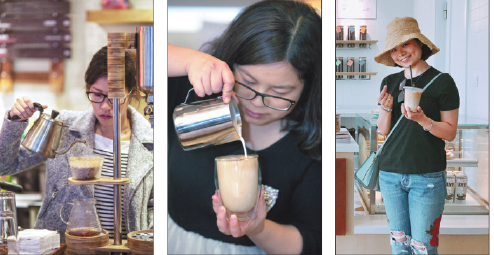Coffee culture comes to the boil in Shanghai


"A few years ago, there was a lot of mediocre coffee on the one hand, and high-quality specialty coffee on the other. Now, there are a lot more players in between and the differentiating factor is not as clear anymore. Specialty coffee needs to work even harder now to show that what it offers is worth the extra money."
Some specialty coffee houses have diversified their business to stay competitive. For instance, Cafe del Volcán sells its coffee beans to some of Shanghai's best restaurants and hotels. Sumerian Coffee has done the same through the Tmall website and its WeChat store.
According to an article on Alizila.com, the Alibaba Group news hub, sales of coffee products on e-commerce sites such as Taobao and Tmall have been experiencing significant growth, expanding by 18 percent year-on-year from September 2017 to the same month last year.
One of those to benefit from this consumption boom is luxury coffee producer Nespresso.
Alfonso Troisi, business executive officer for Nespresso Greater China, said: "We launched our Tmall e-boutique in 2016 followed by the JD e-boutique in 2017. Since then, our e-commerce segment has experienced healthy growth.
"Nespresso offline boutiques have expanded healthily as well. We currently have 12 boutiques, 25 (coffee) corners and 104 trade corners offline on the Chinese mainland."
Looking ahead, however, China Skinny's Tanner foresees a gradual shift from being status-conscious to a demand for better quality. He cites the example of cities such as Melbourne, Australia, or Wellington, New Zealand, where Starbucks has been "pushed out of the market" by specialty coffee places.
"Among Chinese consumers there are foodies who are very particular, and you only need to look at categories such as beer, which has seen an explosion in the craft segment, and the street cred that comes with buying from independent 'boutiques' by post-'90s consumers to know this," he added.
Starbucks has already made efforts to cater to more-discerning consumers. In February, it launched its upscale Starbucks Reserve Bakery Cafe in Shanghai, which offers made-to-order food, premium coffees and even cocktails.
But for now, it appears consumers are not yet that discerning.
Troisi said that "status coffee enthusiasts"-those who drink the beverage because it denotes their presumed standing in society-still comprise the majority of coffee drinkers in China.
"While the nature of status and luxury is evolving in China, status coffee enthusiasts remain the largest segment, and can be seen as trendsetters for others," he said.
"This group of people are proud to be Chinese, but strive to be global. They aspire to travel and know the world, bringing back the 'treasures' they have found on their journeys. Coffee is proof they are worldly. Being able to speak eloquently shows their class as global citizens."
Delivery resistance
Most coffee shops offer deliveries, but according to Weisensee, this tends to compromise the quality of the product.
He said that every second that coffee is in a paper cup, chemical components interact and change the taste, sometimes for the worse. In addition, the coffee usually loses its foam and is cold by the time it is delivered, further affecting the taste.
"Here at Cafe del Volcán, we have been quite resistant to deliveries, but we're planning to offer them soon because so many of our customers have been getting third-party couriers to fetch their coffee. There is clearly a demand for deliveries," Weisensee said.
This demand for convenience is further illustrated by Starbucks' partnership with Ele.me to offer delivery services in Beijing and Shanghai. Industry players also point out that one of the key reasons behind Luckin Coffee's rise in popularity is the fact that it is primarily a takeaway model. Tim Hortons also plans to begin delivery services in the second half of this year.
Weisensee said that while it is not impossible to prepare a cup of coffee for delivery that would taste as good as in the cafe, changes need to be made to the crafting process.
"It takes a lot of preparation to get delivered coffee to taste great. Cafe del Volcán has spent about two years experimenting with the ways we can preserve that great flavor and create a better coffee delivery experience than that currently available," he said.
"Of course, most coffee places wouldn't go to such lengths. Most consumers still prefer convenience and just want a beverage that is 'good enough'."




































